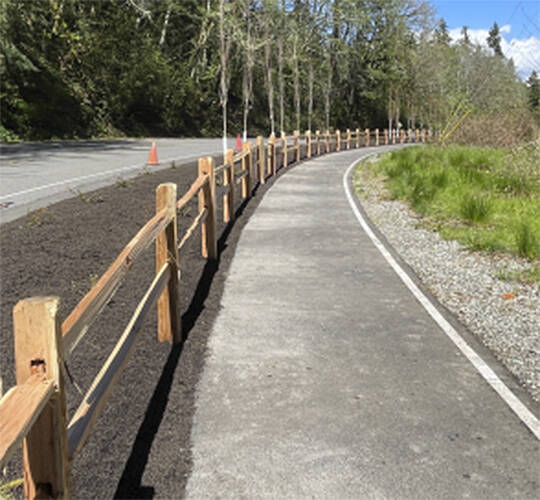“Sign, sign everywhere a sign,
Blockin’ out the scenery, breakin’ my mind…”
-Five Man Electrical Band, 1971
Comedian Bill Engvall’s famous punchline for people doing things that don’t make a lot of sense is, “Here’s your sign.”
The city of Bainbridge Island must agree as it’s taking a look at its ordinance after the proliferation of temporary signs on sidewalks during COVID.
At its City Council meeting May 9, the council is expected to ask city manager Blair King to review its regulations, meet with the business community and return with recommendations. A city memo says BI’s code fails to conform to a 2015 Supreme Court decision. Work started after that ruling, but was delayed during the pandemic. The memo also says city code is complicated, making it hard to enforce.
With the summer tourist season arriving soon, so many signs could increase hazards for people walking around downtown. Complaints have been made about aesthetics, safety and effectiveness of the sandwich boards. The memo goes on to say so many distractions also can decrease traffic safety. The clutter actually hurts business, rather than help it, the memo adds.
The goal of a new law would encourage signs to harmonize with the building design and natural setting, creating a more attractive economic and business climate.
Rates to increase
Also at the meeting the council will look at a 25% increase in water rates each of the next three years and sewer rate increases equal to inflation each of the next three years.
Since first introduced last month, sewer improvements of $5 million more have led to a request to increase connection fees by another 8%. Increased costs include an outfall project in 2027 with a $5.2 million bond.
Monthly water rate hikes given for single-family as examples include: from $27.57 a month for a 1-inch meter to $48.91 in 2025, per meter. For multifamily it would go from $6.04 to $10.71; and for commercial from $4,056 to $7,194 in 2025. Consumption charges are additional.
Examples given for single-family residential one-time connection fees include: from $9,515 to $11,875 for a 1-inch meter to $190,291 to $237,492 for a 6-inch meter. Multi-family and commercial rates are the same: $10,075 to $13,845 for 1 inch to $201,499 to $276,905 for a 6-inch.
Monthly sewer charges would go from $47.94 to $52.32 for single family; $41.99 to $45.83 for multifamily; and $147.41 to $160.88 for commercial. Consumption charges are extra.
Drivers for the increases are improvements over the next six years, including the new Winslow Water Tank and upgrades to the Winslow Wastewater Treatment Plant.
Also, it is noted that water rates actually were lowered from 2011-13 and then were not increased for inflation over the next 10 years. A city memo says water rates now make just enough for operating expenses, and none for improvements.
Comp plan
Council will look at amendments to the city’s Comprehensive Plan. Staff has recommended approval.
Staff originally recommended denial for an amendment in Lynwood Center because it could lead to increased density in an area where no sewer is currently available. However, staff reconsidered as the amendment was changed so that no development is evident at this time.
Also, staff is recommending approval of three Comp Plan amendments for Puget Sound Energy that asks for its substations to be changed from residential to business industrial zoning. PSE says not only is that consistent with the land use since 1960, but it’s also needed to allow more flexibility as it provides updates to improve service. All three sites in Winslow, Port Madison and Murden Cove are also right next to business-industrial zoning.
The main objection from the public was if PSE leaves the site it would be open to other industrial or business uses, but PSE has no plans to leave.
Other news
Climate change officer Autumn Salamack and three members of the city’s climate change committee analyzed five options to offset carbon caused by the new police-court facility. They decided installing solar panels at the site or elsewhere was preferable to replacing gas with electric mowers or upgrading home heating systems to heat pumps.
Also, in his report, King will talk about how BI was one of 12 communities to qualify for technical assistance from the US Department of Energy to transition to renewable energy and increase energy resilience. BI’s goal is 100% renewable electricity by 2040. Staff with the initiative will visit and conduct assessments to figure out next steps.
A 2 1/2 minute video on Sustainable Transportation Plan will be shown, the ad hoc committee is still meeting on changes to the Waste Reduction ordinance and a status report will be given on the Winslow Subarea Plan.
The council will also look at using low-toxicity pesticides in some areas due to improved chemicals, and define what an “inn” is for its moratorium.
On the consent agenda, it is noted that the Eagle Harbor Phase 2 improvements on the shoreline to McDonald include a 5-foot wide separated shoulder at a cost of $1.079 million, which is about $40,000 under budget.
Proclamations are planned for: May 20 Electric Vehicle and Bicycle Awareness Day on BI; May 14-20 BI Police Week; May 21-27 National Public Works Week; and National Urban Fellow Ellyze Francisco.



